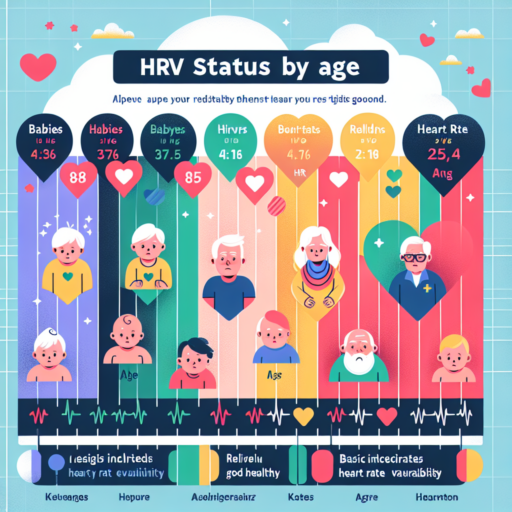What causes a drop in HRV?
Understanding the factors leading to a decrease in Heart Rate Variability (HRV) is crucial for maintaining optimal heart health. HRV refers to the variation in time intervals between heartbeats, and a drop in HRV can indicate stress, fatigue, or potential health issues.
Stress and Anxiety
One of the primary causes of a decrease in HRV is stress and anxiety. When you’re stressed, your body’s fight or flight response is triggered, leading to an increase in heart rate and a reduction in the variability between heartbeats. This response can be beneficial in short bursts but, if the stress is chronic, it can lead to a continuous decrease in HRV, reflecting on your body’s reduced ability to cope with stress.
Poor Sleep Quality
Poor sleep quality is another significant factor that can cause a drop in HRV. Sleep is a time for the body to recover and regulate various functions, including heart rate. A lack of quality sleep disrupts these processes, leading to reduced HRV. It’s not just the quantity of sleep that matters but also the quality, as restorative sleep plays a critical role in maintaining a healthy HRV.
Lifestyle Factors
Lifestyle choices can also impact HRV negatively. Factors such as lack of physical activity, unhealthy diet, and excessive alcohol or caffeine consumption can all contribute to a decrease in HRV. These choices can lead to conditions like obesity, high blood pressure, and other health issues that put additional stress on the heart, thereby affecting its variability in beating patterns.
Understanding these triggers is a step towards managing and improving your HRV, ultimately leading to better heart health and overall well-being.
No se han encontrado productos.
How do I get my HRV back to normal?
Regaining a normal Heart Rate Variability (HRV) is essential for maintaining overall well-being and resilience to stress. One of the primary methods to improve HRV is through regular physical activity. Exercise, especially cardiovascular and aerobic workouts, has been shown to significantly impact HRV by enhancing heart health and reducing stress levels.
Another vital aspect is quality sleep. Poor sleep patterns can greatly affect your HRV, leading to increased stress and anxiety. Establishing a regular sleep schedule, ensuring that you receive 7 to 9 hours of quality sleep per night, can help restore your HRV to normal levels. Incorporating relaxation techniques before bedtime, such as meditation or reading, can also improve sleep quality and thus HRV.
Nutrition likewise plays a critical role in HRV recovery. Consuming a balanced diet rich in fruits, vegetables, and omega-3 fatty acids while limiting caffeine and sugar intake can positively influence your HRV. Hydration is another aspect not to be overlooked; drinking sufficient water throughout the day supports overall cardiovascular health and can aid in normalizing HRV.
When should I worry about my HRV?
Understanding your Heart Rate Variability (HRV) is crucial in assessing your body’s readiness to perform and recover. However, discerning when fluctuations in your HRV are a cause for concern can be challenging. Here, we dive into the critical moments that warrant a closer look at your HRV.
First and foremost, a significant and consistent decrease in your HRV could be a signal that your body is under stress, facing overtraining, or not recovering properly. It’s important to monitor these changes over time rather than worry about day-to-day fluctuations. If your tracking shows a downward trend over weeks, it might be time to evaluate your lifestyle, stress levels, and recovery practices.
Persistent Fatigue and Poor Performance
If you’re noticing ongoing feelings of fatigue alongside a decrease in performance, this could indicate that your HRV is lower than ideal. When your body is stressed, whether due to physical exertion, emotional stress, or lack of sleep, it can manifest in lowered HRV readings. Listening to your body and adjusting your training or recovery methods accordingly is essential to prevent further dips in your HRV.
Being in tune with your body’s signals and understanding how they correlate with your HRV readings can help you identify when to take action. Keep an eye on patterns rather than isolated incidents, and consider consulting with a healthcare professional if you notice continual declines. Remember, maintaining a balanced lifestyle, adequate sleep, and proper nutrition can profoundly impact your HRV and overall well-being.
What is the best exercise to increase HRV?
Identifying the best exercise to increase Heart Rate Variability (HRV) involves understanding the unique interplay between different types of physical activities and autonomic nervous system regulation. HRV, a measure of the variation in time between each heartbeat, is often used as an indicator of the body’s resilience and capacity to manage stress. Engaging in the right exercise can significantly enhance HRV, indicating improved autonomic balance and stress resilience.
High-Intensity Interval Training (HIIT)
High-Intensity Interval Training (HIIT) has emerged as a front-runner in the quest to improve HRV. HIIT involves short bursts of very intense activity, alternated with low-intensity recovery periods. This type of exercise is particularly effective at improving cardiovascular health, which in turn, positively impacts HRV. By pushing the heart to adapt to changing demands, HIIT encourages a more flexible and responsive cardiovascular system, thereby potentially increasing HRV over time.
Yoga and Mindfulness-Based Practices
On the opposite end of the spectrum, mindfulness-based exercises such as yoga also hold significant promise for enhancing HRV. The slow, deliberate movements combined with deep, controlled breathing patterns engage the parasympathetic nervous system, known for ‘rest and digest’ functions. Through the promotion of relaxation and stress relief, yoga contributes to a healthier autonomic balance and potentially, a higher HRV. The consistent practice of mindfulness and meditation within these exercises can further augment HRV, by enhancing the body’s stress management capacity.




